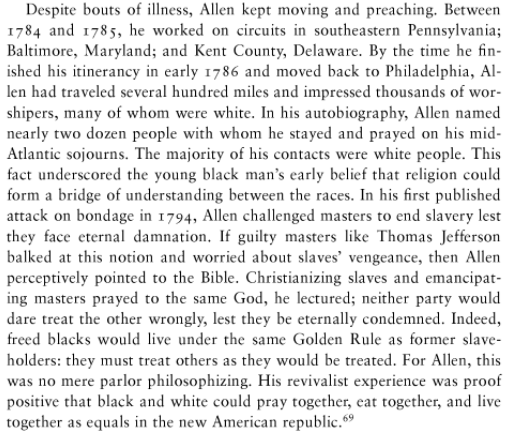Richard Newman's biography highlights RA's experience with integrated Methodist revivals.
- Type
- Book
- Source
- Richard S. Newman Non-LDS
- Hearsay
- Secondary
- Reference
Richard S. Newman, Freedom's Prophet: Bishop Richard Allen, the AME Church, and the Black Founding Fathers (New York: New York University Press, 2008).
- Scribe/Publisher
- New York University Press
- People
- Richard S. Newman, Richard Allen
- Audience
- Reading Public
- Transcription
Despite bouts of illness, Allen kept moving and preaching. Between 1784 and 1785, he worked on circuits in southeastern Pennsylvania; Baltimore, Maryland; and Kent County, Delaware. By the time he finished his itineracy in early 1786 and moved back to Philadelphia, Allen had traveled several hundred miles and impressed thousands of worshipers, many of whom were white. In his autobiography, Allen named nearly two dozen people with whom he stayed and prayed on his mid-Atlantic sojourns. The majority of his contact were white. This fact underscored the young black man's early belief that religion could form a bridge of understanding between the races. In his first published attack on bondage in 1794, Allen challenged masters to end slavery lest they face eternal damnation. If guilty masters like Thomas Jefferson balked at this notion and worried about slaves' vengeance, then Allen perceptively pointed to the Bible. Christenizing slaves and emancipating masters prayed to the same God, he lectured; neither party would dare treat the other wrongly, lest they be eternally condemned. Indeed, freed blacks would live under the same Golden Rule as former slaveholders; they must treat others as they would be treated. For Allen, this was no mere parlor philosophizing. His revivalist experience was proof positive that black and white could pray together, eat together, and live together as equals in the new American republic.
- Citations in Mormonr Qnas
The B. H. Roberts Foundation is not owned by, operated by, or affiliated with the Church of Jesus Christ of Latter-day Saints.

